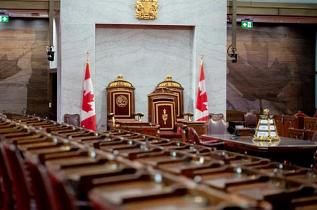There's another new faction in the Senate: the Progressive Senate Group
The Independent Liberal Senate caucus is disbanding today and all of its members are about to join a new entity called the Progressive Senate Group as the reorganization of Canada's upper house continues apace.
Dismantling the Liberal caucus in the chamber means the upper house will be left without a sitting Liberal senator for the first time since Confederation.
The interim leader of the group, New Brunswick Sen. Joseph Day, said the senators are united by a belief in liberty and equality and a commitment to a progressive vision of Canada, where the government has a positive role to play in advancing the public interest. Sen. Day said he hopes other like-minded senators will join the Progressive ranks now that his group has dropped the "Liberal" label.
"Can we attract new senators or existing senators to this new group? I hope so. We'll make sure all senators understand our vision, where we hope to go and how we can contribute and complement other groups within the Senate," Day told CBC News.
Day said this new entity has "no ties at all" to the federal Liberal Party under Prime Minister Justin Trudeau.
"It's not a name change. In fact, we're creating a new group," he said.
"The Liberal Party in the Senate is no longer."
Sen. Day said the "progressive" label was chosen deliberately.
"The reason we're going to 'progressive' is because it's a broader umbrella ... You heard during the election campaign talk of progressive legislation — the NDP, the Bloc and the Greens and the Liberals always talked about 'progressive' legislation and we wanted to reflect that changing dynamic in politics," he said.
The only requirement for senators seeking membership is that they support progressive politics and the Charter of Rights and Freedoms, and are committed to advancing reconciliation with Indigenous Peoples.
Members of the new group will be free to vote on legislation as they see fit and they will not be "whipped" to back bills from the Liberal government, Day said. Senators will be free to engage in "other political activities," like holding membership in political parties.
Shock move
The Liberal caucus in the upper house was cut loose from the national Liberal caucus in the House of Commons in 2014 by then-third party leader Justin Trudeau as he pushed a Senate reform agenda that he hoped would rid the place of partisan politics without major constitutional change.
The shock move, carried out while the Senate expenses scandal raged on, left Liberal senators in the lurch as these long-time party supporters were shunned by a leader bent on eliminating party politics in the upper house. The group continued to carry the Liberal banner in the Red Chamber even after Trudeau severed all formal ties.
Since his election in 2015, Trudeau has relied on an advisory board to help him appoint independent members to the Senate. Most of those appointees now sit as members of the Independent Senators Group (ISG).
While ISG and Liberal senators have shared common cause on some government legislation, the new Trudeau appointees have opted not to sit within the Liberal caucus out of fear of being branded as partisan.
"We have talked about this for some time. Are we attracting to our group all the people that you would normally expect to be attracted to our group?" Day said.
"There was always the question ... did we have a direct or indirect link with the Liberal Party in the House of Commons? We made the point throughout that the Liberal group in the Senate did not have any contact with the Liberal Party in the other place but, still, there was a question."
Facing extinction
The leader of this fledgling Progressive Senate Group now hopes to peel away some ISG members to help bolster a group of senators that was on the verge of extinction.
Under Senate rules, a group or caucus must have at least nine members to be considered a "recognized" group, which entitles it to extra funding to hire support staff and fund research activities.





